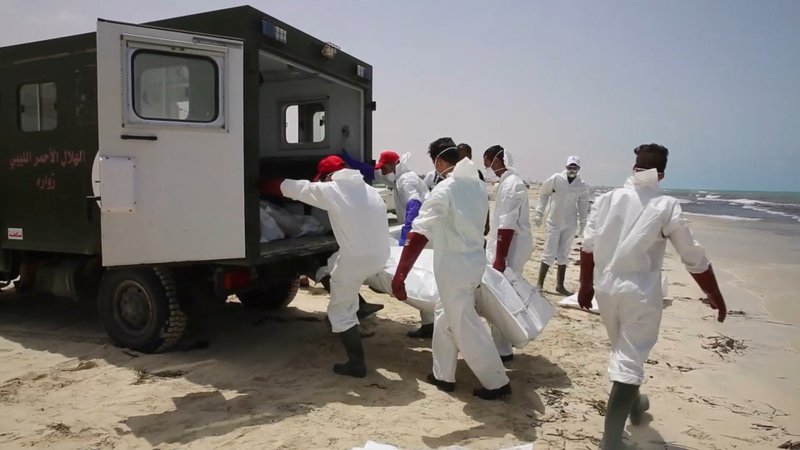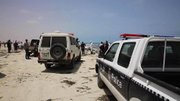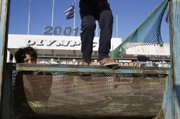ATHENS, Greece -- More than 110 bodies were found along a Libyan beach after a smuggling boat of mostly African migrants sank, while a separate search-and-rescue operation across the Mediterranean saved about 340 people Friday and recovered nine bodies.
The developments were the latest deadly disasters for refugees and migrants seeking a better life in Europe, and they followed the drownings of more than 1,000 people since May 25 who were attempting the long and perilous journey from North Africa to southern Europe.
As traffickers take advantage of improving weather, officials say it is impossible to know how many unseaworthy boats are being launched -- and how many never reach their destination. Naval operations in the southern Mediterranean, coordinated by Italy, have been stretched just responding to the disasters they do hear about.
According to a spokesman for the International Organization for Migration, 342 migrants were rescued. The search continued throughout the day.
At least 117 bodies --75 women, six children and 36 men -- washed up on a beach or were pulled from the water near the western Libyan city of Zwara on Thursday and Friday, said Mohammed al-Mosrati, a spokesman for Libya's Red Crescent. All but a few were from African countries. The death toll was expected to rise.
The children were aged between 7 and 10, said Bahaa al-Kwash, a top media official in the Red Crescent.
"It is very painful, and the numbers are very high," he said, adding that the dead were not wearing life jackets -- something the organization had noticed about bodies recovered in recent weeks.
"This is a cross-border network of smugglers and traffickers, and there is a need for an international effort to combat this phenomenon," he said.
As is frequently the case, authorities were uncertain when or how the people died. The coast guard found an empty boat drifting Thursday, Libyan navy Col. Ayoub Gassim said, adding it was possible the vessel had capsized a day earlier.
Al-Mosrati of the Red Crescent said the bodies were not decomposed and had drowned in the past 48 hours. The empty boat might have been the one carrying the victims, but strong winds and currents can push bodies from one place to the other, he added, making it difficult to determine where the disaster occurred.
The first signs of a disaster often are either a mayday call from a passenger or the discovery of bodies.
Gassim blamed Europe for "doing nothing but counting bodies" in trying to stop the flow of migrants from Libya.
The accusation struck a chord even in Brussels, the EU headquarters, where some critics cited the nature of EU policymaking.
"Everybody knows what needs to be done -- an EU border and coast guard agency," said Marc Pierini, a former EU ambassador to both Libya and Syria.
The EU does have a border control agency, known as "Frontex." But it has neither vessels nor surveillance equipment of its own, relying instead on individual EU member states to provide both.
"We are definitely in crisis-management mode only, which is not good for seeing the next crisis coming and getting the proper structures in place," Pierini said in a telephone interview from Brussels.
"We are dealing with short-termism. And basically putting patches on leaks," he said. "They talk about keeping the numbers down, as if the numbers are not human beings like you and me."
An Italian official, speaking on condition of anonymity to discuss EU deliberations, said Italy has been pressing its European partners for more than a year to take greater action, such as deploying more ships and other resources, to address the growing number of deaths in the Mediterranean.
Another obstacle is resistance from both the Italian and Greek governments to hosting any substantial, long-term humanitarian aid operations on their shores. The rationale typically stems from a desire to protect their countries from becoming holding pens for migrants who have no claim to EU asylum.
As the archbishop of Milan, Cardinal Angelo Scola, told the Italian newspaper La Repubblica: "Because of its geographical position and because of a social and cultural resilience, Italy could, should have a leading role" in accommodating asylum seekers.
German Chancellor Angela Merkel said the increase in peoeple crossing the Mediterranean is reviving pressure on the EU and other members need to help resettle refugees and other migrants.
"We can't just leave Italy arbitrarily on its own," Merkel told a state gathering of her Christian Democratic Union party in Prenzlau. "We need to talk to each other about how we share the burden."
Libya has been in chaos since the ouster and killing of its longtime autocratic ruler Moammar Gadhafi in 2011. The country has been split into rival governments, with each supported by a loose set of militias and tribes. Smuggling gangs have taken advantage of the turmoil to send waves of overcrowded boats toward Italy and other parts of Europe.
Hadi al-Zowaghi, a Red Crescent representative in the Libyan town of Sabratha, criticized area security forces for not trying to stop the human trafficking and failing to properly document those who die.
"Burial is arbitrary, no data kept, no grave numbers, nothing, as if these people never existed," al-Zowaghi said from Sabratha, a major transit area for migrants near Zwara, which is where the bodies were found.
"These are real people with names and stories," he said. "They had families. They deserve to be buried properly and their relatives deserve to be notified."
The number of people drowning is "huge," with dozens washing ashore each week, he said. Volunteers also were worried about the environmental impact of the dead along the beaches, he said.
The Zwara Municipal Council criticized the silence of Libyan authorities and the lack of an international response to the continuing loss of life.
Aid officials say the past two weeks have been especially deadly because smugglers are using riskier tactics such as bigger boats that are even less-seaworthy than before.
340 rescued
About 75 nautical miles south of Crete, another migrant boat sank Friday, with Greek authorities saying 340 people were rescued and nine bodies recovered in an operation involving Greek helicopters, planes, patrol boats and merchant ships.
Greece's coast guard said the roughly 82-foot vessel had been carrying an undetermined number of people when it was located half-sunk in international waters. It was not immediately clear where the boat was from, where it was headed or who had been aboard.
Most survivors were picked up by the Norwegian-flagged tanker Clipper Hebe and were being taken to the Sicilian port of Augusta in Italy. Others were to be taken to Egypt, Turkey and Malta.
"The information we have on the number of people on board the vessel is still unclear -- we've heard that there were 400 or 500 people on board, but we cannot confirm that number," coast guard spokesman Nikos Lagadianos said. "There is a huge rescue effort underway."
Elinor Raikes of the International Rescue Committee said such incidents show "that desperate people will continue to attempt these treacherous journeys until adequate legal alternatives to safety are established."
Border closures, she said, "will only result in new and alternative smuggling routes, and we can expect many more of these tragedies to occur as dangerous journeys present the only option."
The shorter Aegean Sea crossing from Turkey to the Greek islands was the preferred sea route for those heading to Europe until Balkan countries closed their borders in March and the European Union reached an agreement with Turkey to send back any newcomers. The deal has led to a dramatic decrease in the number of people landing on the islands from Turkey.
With 2015 as the deadliest year on record for those who sought passage into Europe by sea, more than 2,500 people have died so far this year, compared with 1,800 in the same period last year, according to the International Organization for Migration.
EU-Turkey deal ripped
Also Friday, Amnesty International urged the EU to stop plans to return asylum-seekers to Turkey.
The rights group issued a 35-page briefing saying the EU-Turkey deal to curb irregular migration was "illegal" and "reckless."
Turkey is hosting 3 million refugees, including 2.75 million Syrians, and is expected to receive more as part of the deal with the EU. The agreement called for irregular migrants who arrived to the Greek islands from Turkey after March 20 to be sent back to Turkey.
The EU, in turn, is to resettle one Syrian refugee from Turkey to the bloc for each Syrian that Greece returns to Turkey. Turkey also stands to receive more than $6 billion in aid, visa-free travel and fast track negotiations on EU accession.
The deal, according to Amnesty, is unlawful because asylum-seekers don't access "effective protection" in Turkey.
Amnesty argued that Turkey lacks the capacity to process asylum applications and falls short on key criteria to be deemed a "safe third country."
"In its relentless efforts to prevent irregular migrants to Europe, the EU has willfully misrepresented what is actually happening on the ground in Turkey," said John Dalhuisen, Amnesty's director for Europe and Central Asia.
Turkey, it noted, doesn't accord full refugee status, and most refugees in the country don't get government support, which limits their prospects of long-term integration.
There was no immediate comment from Turkish officials, but they have rejected previous Amnesty International reports on the issue of forced returns.
Information for this article was contributed by Elena Becatoros, Maggie Michael, Rami Musa, Derek Gatopoulos, Nicholas Paphitis, Jamey Keaten and Colleen Barry, Dominique Soguel and Bram Janssen of The Associated Press; by James McAuley, Stefano Pitrelli and Erin Cunningham of The Washington Post; and by Patrick Donahue of Bloomberg News.
A Section on 06/04/2016



